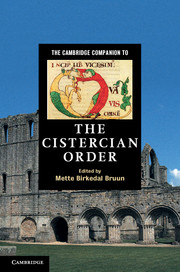Book contents
- Frontmatter
- Contents
- Figures
- Contributors
- Preface
- Abbreviations
- Introduction
- Part I History
- Part II Structure and materiality
- Part III Religious mentality
- 12 Bernard of Clairvaux
- 13 Bernard of Clairvaux
- 14 Early Cistercian writers
- 15 The spiritual teaching of the early Cistercians
- 16 Cistercians in dialogue
- 17 Preaching
- 18 Liturgy
- Map of Cistercian monasteries
- Primary sources
- Further reading
- Index
- References
15 - The spiritual teaching of the early Cistercians
from Part III - Religious mentality
Published online by Cambridge University Press: 05 December 2012
- Frontmatter
- Contents
- Figures
- Contributors
- Preface
- Abbreviations
- Introduction
- Part I History
- Part II Structure and materiality
- Part III Religious mentality
- 12 Bernard of Clairvaux
- 13 Bernard of Clairvaux
- 14 Early Cistercian writers
- 15 The spiritual teaching of the early Cistercians
- 16 Cistercians in dialogue
- 17 Preaching
- 18 Liturgy
- Map of Cistercian monasteries
- Primary sources
- Further reading
- Index
- References
Summary
In his Sermo de diversis 121 Bernard of Clairvaux told his monks: ‘We are in the school of Christ (In schola Christi sumus), and there we learn two teachings: the one that the one true Master teaches us himself, that is, love; and the other through his ministers, that is, fear.’ The appeal to being in the ‘school of Christ’ was a mark of the self-identity of the Cistercian Order. Manifested in the abbot of Clairvaux, and also illustrated by three other major early Cistercian theologians influenced by him (William of Saint Thierry, Aelred of Rievaulx and Isaac of Stella), the ‘great miracle’, as Bernard put it, of the success of the Cistercians made a lasting impact on the medieval world. The institutional, political and cultural roles of the Cistercians are presented in other essays in this volume; here I will concentrate on their spiritual theology during the fifty years between c. 1120 and 1170. However much scholars continue to study the Cistercian Order, if the early Cistercians still reach a wide audience, it is fair to say it is largely because of their spiritual teaching, what they learned ‘in the school of Christ’.
The goal of learning in Christ’s school was not restricted to monastics. Bernard and his confreres believed that all the baptised are called to deeper knowledge and more intimate contact with God, even to the embrace of the Divine Word. In SC 83.1 Bernard says that all Christians are called to marriage with the Word, though monastics have a privileged highway to the goal. Although the White Monks were the virtuosi of the religious life, they felt an obligation to speak, both to other monks and (as history has shown) to non-monastics.
- Type
- Chapter
- Information
- The Cambridge Companion to the Cistercian Order , pp. 218 - 232Publisher: Cambridge University PressPrint publication year: 2012



